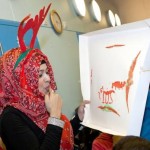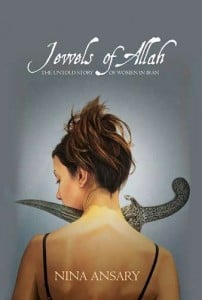As 2012 draws to a close, we’ll be posting some highlights from this year’s posts. We published way too much to be able to go back through all of it in detail (that’s what the archives are for!), but these highlight posts will include some posts that stood out from each of our writers over the past year. See Part 1 here.
“Maryam Talks Back” by Sya
“But why is Maryam, even as a symbol of an “entire generation of Indonesians,” yet another Muslim woman who needs to be saved by the West?
Just as some Western activists feel a need to rescue Muslim women from oppression by Muslim men, Mercy Mission as part of the Global North wants to rescue poor Maryam from the religious oppression of her fellow citizens. Maryam is portrayed as vulnerable to emotional weakness and peer influences and is quickly swept along by cunning Christians offering love and support. Would the choice of a teenage male migrant or a grimy street child (more likely candidates for Christianisation in Indonesia) would have attracted more donations instead of an anonymous and demure hijabi?”
(Note: This was originally a guest post; Sya is now a regular MMW contributor.)
“Re-Engaging with the Other ‘Liberation Theology’” by Sana
“A body clad in a headscarf is not a body liberated from social expectations and demands. From both within the Muslim community and from outside of it, women remain encumbered with pedestals for their looks, their personalities and their bodies. This isn’t a problem of religion; it is a problem of cultures and communities – often clashing. There are expectations for hijab-clad women, within many of the diverse North American Muslim communities, in how they handle themselves, how they interact with the opposite sex (if at all). Even their religiosity and level of religious knowledge are assumed. Women wearing hijab are no longer allowed to be humans prone to err, as God created us and as God acknowledges, but rather are expected to have achieved some sort of unwavering piety resulting from fabric choice. Instead, they can become objects for observance and representation; a sort of silent groups of members of a “clergy.” And these standards, of course, are not necessarily the same for women without hijab – as they are often already seen as “not quite there yet,” or outside the fold of physical, “tangible” piety.”
“Ridiculing Boko Haram Where It Hurts” by Anike
“That this track came from men that are said to be smart and funny, who make fun of anything while criticising deeper social problems and religious extremism makes it even more confusing. It is difficult to see the problems and/or major social issues that are being discussed in Sexin’ Islamic Girls. Is it the terror that is caused by Boko Haram? Or is it just a jab at sexually active Muslim women? It looks more like Sexin’ Islamic Girls ridicules Boko Haram by using the women related to the terrorist group. Sexin’ Islamic Girls is so poorly done, perhaps it would have been more enjoyable if FOKN Bois had poked fun at Boko Haram directly. FOKN Bois objectify Muslim women to make fun of a terrorist organisation, and they are doing this from the outside.”
“This Is Why You’re Single, Muslim Ladies” by Sara
“If you’re wondering why you haven’t had any success at masjid mixers, or you’re cursing that seemingly wasted subscription at Naseeb, I’ve got some answers for you. Chances are that you fall into one of these categories of ladies unfit for a Muslim gentleman (thanks to my friends at Muslim Spice for bringing this important matter up):
You’re using social media: It might be time to axe your Twitter and Facebook accounts, because your online presence is probably warding off potential suitors. It has been proven, by many studies, that no Muslim woman can resist logging into a social networking site without making posts about getting lost in Tariq Ramadan’s eyes. Of course, all conversations held by females are useless, and men only use social networking sites for the important business of men. If you’re using it for professional reasons (trick statement: your only valid role is being a homemaker), then that might be OK — but I’m afraid that I would have to recommend doubling up on your prayer to avoid falling prey to the Internet’s slippery slope. “
“For Arab Women, Change in the Digital Reality is Coming, but Slowly” by Samya
“Online content should not only aim at enriching Arab women’s knowledge, but it should also seek to enhance appreciation of their psychological and social concerns listening to them, through different social interaction platforms.
Women-related content should become part of the mainstream news media sites, because statistics show that visitors mainly use the internet to get news. Online media need to do more towards educating both men and women about self development, and encouraging them to obtain their right positions in society.
Online activism and movements have proven to play a significant role in bringing about concrete changes on the ground. The Egyptian and Tunisian experiences have offered ample evidence that through coordinated networking, social and political mobilization would be possible. Of course, for a region long marked by conservative views of women role in building their communities, getting women engaged online may not look like a short-term target. But through systematic education and social empowerment, a greater presence of Arab women in cyberspace could be quite possible in the coming years.”
“The Pink Hijab Day Blues” by Krista
“I’ve never seen Pink Hijab Day information that focused specifically on breast cancer as it might personally relate to Muslim women specifically; the two issues get constructed as if they’re completely separate, rather than looking at what the needs might be within Muslim communities. There is, in fact, a lack of available culturally- and linguistically-appropriate information on breast cancer for Muslim communities in many places (the United States, for example), and if Pink Hijab Day is a chance for Muslims to think about breast cancer, this is an important issue that we should consider. MMW writer Safiyyah has written about Muslims need to be more open in talking about breast health, reminding us that “there is no shame in religion.”
So if we are going to use Pink Hijab Day to talk about Islam and Muslims, maybe it would make the most sense to focus our attention on breast cancer as it relates to needs and taboos within Muslim communities, rather than on dismantling misconceptions about the headscarf.
And do I even need to point out how annoying it is when education on Muslim women and Islam gets framed primarily around our clothing?”
//www.patheos.com/blogs/mmw/2012/01/for-arab-women-change-in-the-digital-reality-is-coming-but-slowly/












